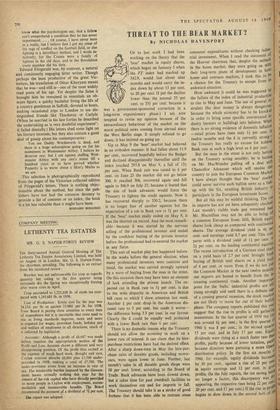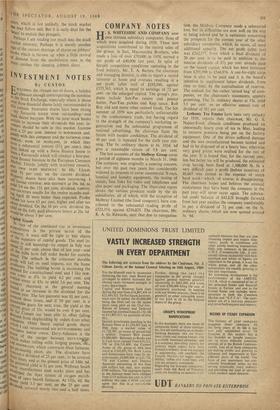THREAT TO THE BEAR MARKET?
By NICHOLAS DAVENPORT
UP to last week I had been working on the theory that the 'bear' market in equity shares, which began on January 5 when
the FT index had marked up 342.9, would last about nine months and would carry the in- dex down by about 15 per cent. to 20 per cent. (I put the decline lower than the normal 25 per cent. to 331 per cent. because it was a government-sponsored correction in a long-term expansionary phase.) I am now tempted to revise my opinion because of the extraordinary behaviour of the market on the worst political news coming from abroad since the West Berlin siege. It simply refused to go down; it has insisted on going up.
Up to May 9 the 'bear' market had behaved in an orthodox manner. It had fallen about 11.9 per cent., recovered hopefully before the Budget and declined disappointedly thereafter until the index touched 295.8 on May 9, a fall of 134 per cent. When Bank rate was raised to 6 per cent. on June 23 the market did not go below 300. It reached 306, recovered again and fell again to 306.9 on July 27, because it feared that the size of bank advances would force the Treasury to tighten the credit squeeze. Now it has recovered sharply to 330.2, because there is no longer fear of another squeeze but the expectation of a cut in Bank rate to 54 per cent. If the 'bear' market really ended on May 9, it was the shortest on record. And the most remark- able—because it was started by the nervous selling of the professional investor and ended by the confident buying of the private investor before the professional had re-entered the market in any force.
This sort of market play has happened before. In the weeks before the general election, when many professional investors were cautious and timid, the market was carried strongly upward by a wave of buying from the man in the street. On this occasion there may have been an element of luck attending the private hunch. The ex- pected cut in Bank rate to 54 per cent, is due to the wide disparity in American and British bill rates to which I drew attention last week. Another i per cent, drop in the American dis- count rate to 3 per cent, has made it worse-- the difference being 3.3 per cent. in our favour. Clearly the £ could be equally well protected with a lower Bank rate than 6 per cent.
There is no domestic reason why the Treasury should not allow the economy to work on a lower rate of interest. It can claim that its hire- purchase restrictions have had the desired effect. After a sharp down-turn in May the hire-pur- chase sales of durable goods, including motor- cars, were again lower in June. Further, last month's sales in all durable goods shops were 10 per cent lower, according to the Board of Trade. Bank advances have been slowed down, but it takes time for past overdraft facilities to work themselves out and for imports to fall. The Treasury should take it as a stroke of good fortune that it has been able to restrain some consumer expenditures without checking indus• trial investment. When I read the statement of the Hoover chairman that, despite the setback in the home market, they were going on with their long-term plans of development in both home and overseas markets, I took this to he a chance for the Treasury to escape from its awkward situation.
How awkward it could be was suggested bY the failure of the index of industrial production to rise in May and June. The use of general re. straints like dear money is always dangerous, because the whole economy has to be knocked in order to bring some specific overstrained in' dustry (motors or building) into balance. When there is no strong evidence of domestic inflation —retail prices have risen only If per cent. in twelve months and the £ is currently strong-- the Treasury has really no excuse for holding Bank rate at such a high level as 6 per cent.
But the man in the street is not only betting on the Treasury acting sensibly; he is betting on Mr. MacWonder pulling off a deal with Chancellor Adenauer which will enable this country to join the European Common Market. I have always thought that the 'bear' market could never survive such bullish news as a link' up with the Six, enabling British industry t° participate in the European investment boom. But all this may be wishful thinking. The rise in imports has not yet been adequately checked' Last month's visible trade gap remained bad. Mr. Macmillan may not be able to bring nil a common European front. Still, British equItY shares look cheap as compared with continent shares. The average dividend yield is 4/ Pet cent. and earnings yield 8.7 per cent. This cool pares with a dividend yield of 11 per cent. to 21 per cent, on the leading continental equities The recent introduction of a German steel shall on a yield basis of 2.7 per cent. brought fresh buying of British steel shares on a yield basis of 4 per cent. or more. Even if we do not jot° the Common Market in the next twelve months, our exports are bound to benefit from the itt. creasing continental trade. Another importalit point for the 'bulls,' industrial profits are still rising strongly and until there is a definite sig° of a coming general recession, the stock market° are not likely to move far out of 'their bullish phase. The company reports published this Yent suggest that the rise in profits is still gathering momentum. In the last quarter of 1959 the riss was around 64 per cent.; in the first quarter ni 1960 it was 8 per cent.; in the second quartet 15 per cent. and in July 17 per cent. Equiti dividends were rising at a much faster rate that profits, partly because of lower taxation, partisi because directors were pursuing a more libel', distribution policy. In the first six months 1960, for example, equity dividends increa by 30 per cent., against a rise of 23 per in equity earnings and 12 per cent. in gr°' profits. (In the July reports, the tax saving be no longer a factor, this discrepancy was CII5 appearing, the respective rises being 22 per cent' 20 per cent, and 17 per cent.) If the rise in profiti begins to slow down in the second half of th°
It
Years, which is not unlikely, the stock market Pse may follow suit. But it is early days for the bears' to exploit that prospect. Perhaps I am reading too much into the stock market recovery. Perhaps it is merely another sign of the current shortage of shares on jobbers' b°°ks which is thrown up when a little revival Of demand from the unobtrusive man in the street catches the sleeping jobbers short.



































 Previous page
Previous page